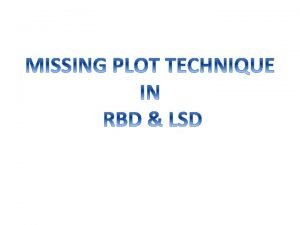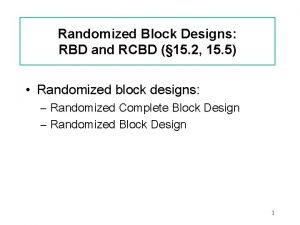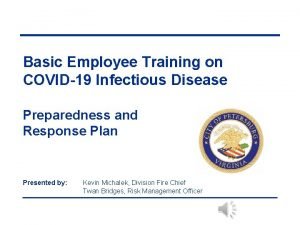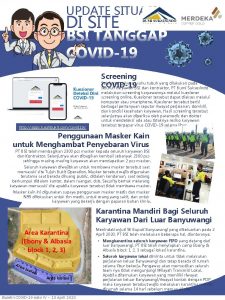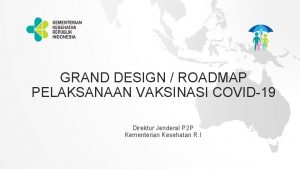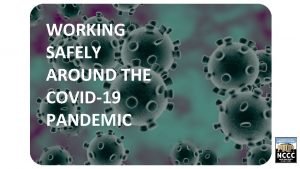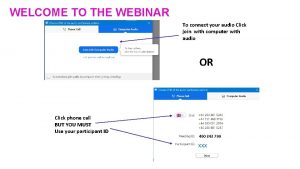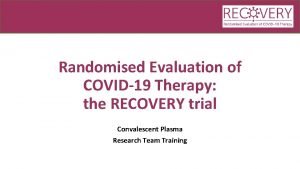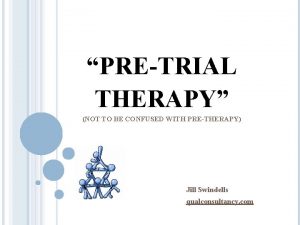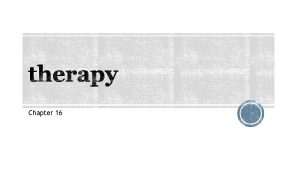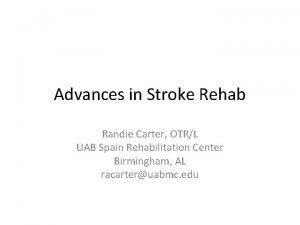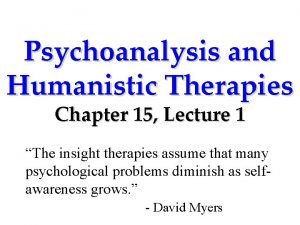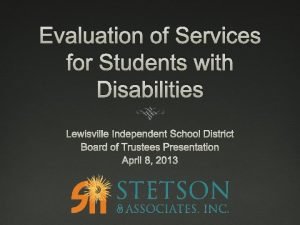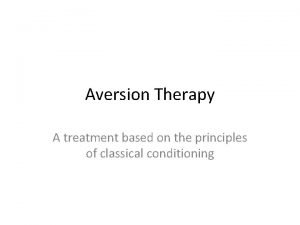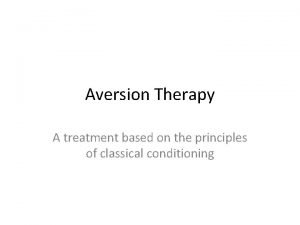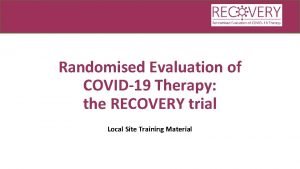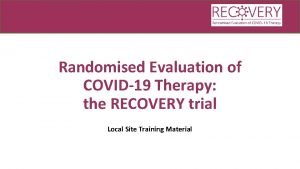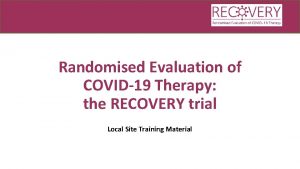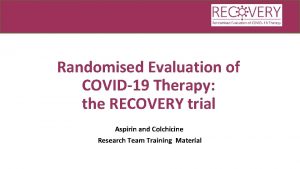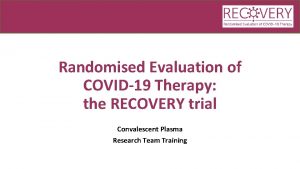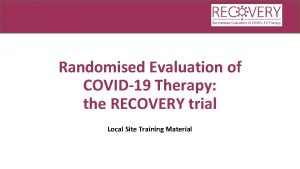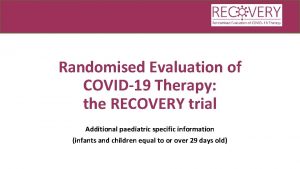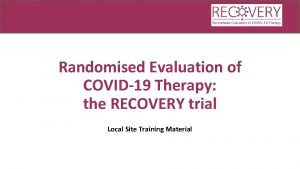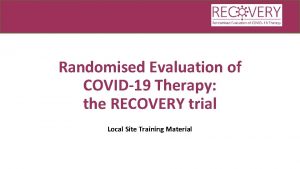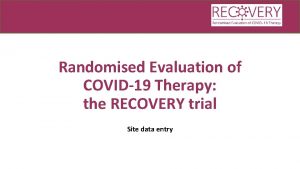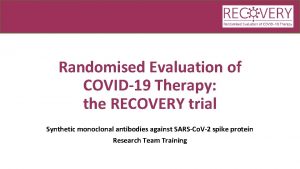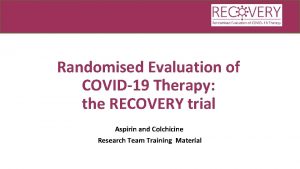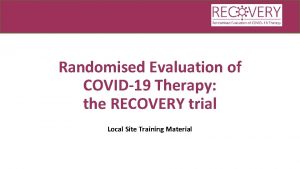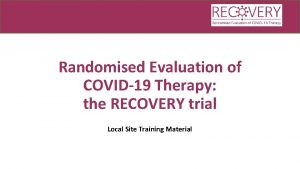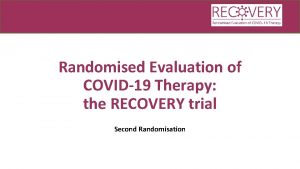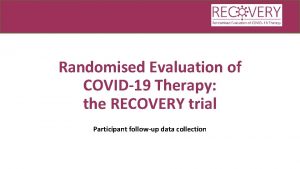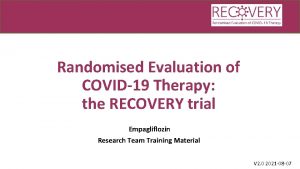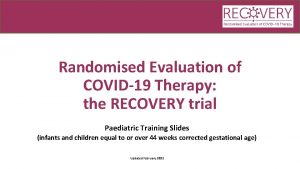Randomised Evaluation of COVID19 Therapy the RECOVERY trial






















- Slides: 22

Randomised Evaluation of COVID-19 Therapy: the RECOVERY trial Paediatric Training Slides (infants and children equal to or over 44 weeks corrected gestational age) [22/07/2020)

Background: COVID-19 • The majority of children who develop COVID-19 present with mild symptoms or are asymptomatic. • For the few children that develop severe or life-threatening acute respiratory presentations of COVID-19, a robust evidence base is essential to guide the use of effective treatments and to avoid potential harm • The RECOVERY trial has demonstrated that dexamethasone reduces the risk of death for adults patients requiring oxygen and this has now become standard of care for adults and children and continues to investigate the efficacy of other treatments for patients with COVID-19. • RCPCH treatment criteria should be used to guide the decision about treatment and therefore enrolment into RECOVERY for patients with acute respiratory presentations of COVID-19. (RCPCH guidelines are constantly being updated please make sure you are aware of the latest version). • It is anticipated that any child with COVID-19 being considered for treatment (over and above supportive care), should be enrolled in RECOVERY

Background: PIMS-TS • A small proportion of children who are exposed to SARS-Co. V 2 develop an inflammatory syndrome which has been recently identified and termed Paediatric multisystem inflammatory syndrome temporally associated with SARS-Co. V-2 (PIMS-TS). • Some of these children will improve with no treatment and others are more unwell and require intensive care and immunomodulation. • Children with PIMS-TS are eligible for inclusion in RECOVERY.

Patient information leaflets and Consent • Children <10 years of age should be provided with the ‘younger’ children information leaflet and this should be read along with their parent(s) or guardian(s). The parent or guardian should sign the consent form. • Children aged 10 -15 years of age should be provided with the relevant information sheet and the child given the opportunity to sign the information sheet to indicate their assent, if they are well enough and signature is possible. The parent / guardian should sign the consent form (or witnessed consent used). • Young people aged >16 years should be provided with the ‘adult’ information sheet and they should sign the consent form (or witnessed consent used). • Witnessed consent may be obtained over the telephone or web video link if hospital visiting rules or parental infection mean a parent/guardian cannot be physically present.

Options for Randomisation • 1 st stage interventions: • Randomisation 1 A: No additional treatment Azithromycin IVIg Methylprednisolone • Randomisation 1 B: Optional (can be done with or instead of above interventions) No additional treatment Convalescent plasma 2 nd stage interventions: only open to children > 1 year of age No additional treatment Tocilizumab

RECOVERY for PIMS-TS Aim: compare steroids vs no additional treatment (in presence and absence of IVIg) and IVIg vs no additional (in presence and absence of steroids). This design: • Allow investigators to use no treatment, IVIg or steroids or as standard care if deemed necessary • Allow effects of steroids and IVIg to be compared with no additional treatment separately (in presence and absence of other drug) • Allow wide spectrum of severity to be recruited because some treatment can be guaranteed but not absolutely required • Second randomisation to tocilizumab is still available. • Also collects baseline use of steroids/IVIg at second randomisation (although not recommended this is in case clinicians go off-protocol in-between two randomisations)

Acute respiratory presentation of COIVID-19 scenario Child meets RCPCH criteria for treatment of confirmed or suspected COVID-19 in child with acute respiratory presentation (infants and children >44 weeks corrected gestational age) www. rcpch. ac. uk/resources/covid-19 -clinical-management-children-admitted-hospital-suspected-covid-19 Yes Treat according to standard of care Randomise to 1 st stage interventions: Randomisation A: No additional treatment vs azithromycin (if no contraindications) Randomisation B: No additional treatment vs Convalescent plasma No Not suitable for enrolment into RECOVERY trial If clinical deterioration, reassess against RCPCH criteria Evidence of ongoing fever and inflammation or clinical deterioration? Yes Randomise to 2 nd stage interventions: Tocilizumab no additional treatment No Do not proceed to 2 nd stage interventions

PIMS-TS Scenarios Patient with PIMS-TS enrolled in RECOVERY Patient received IVIg or corticosteroids prior to enrolment? No 1 IVIg given 2 Corticosteroids given 3 IVIg and corticosteroids given 4

Scenario 1: Patient with PIMS-TS who has not received treatment* prior to enrolment *IVIg, methylprednisolone or equivalent to ≥ 2 mg/kg prednisolone Azithromycin should be marked as unsuitable for 1 st stage intervention Randomise to IVIg vs methylprednisolone vs no additional treatment

Scenario 1: Patient with PIMS-TS who has not received treatment* prior to enrolment *IVIg, methylprednisolone or equivalent to ≥ 2 mg/kg prednisolone Azithromycin should be marked as unsuitable for 1 st stage intervention Randomise to IVIg vs methylprednisolone vs no additional treatment Evidence of ongoing fever and inflammation or clinical deterioration? Yes Can transfer to tertiary centre if clinically necessary Randomise to 2 nd stage interventions: Tocilizumab / no additional treatment No Do not proceed to 2 nd stage interventions

Scenario 2: Patient with PIMS-TS who has already received IVIg prior to enrolment Select IVIg as unsuitable for 1 st stage intervention Azithromycin should be marked as unsuitable for 1 st stage intervention Randomise to methylprednisolone vs no additional treatment

Scenario 2: Patient with PIMS-TS who has already received IVIg prior to enrolment Select IVIg as unsuitable for 1 st stage intervention Azithromycin should be marked as unsuitable for 1 st stage intervention Randomise to methylprednisolone vs no additional treatment Evidence of ongoing fever and inflammation or clinical deterioration? Yes Can transfer to tertiary centre if clinically necessary Randomise to 2 nd stage interventions: Tocilizumab no additional treatment Tocilizumab / no additional treatment No Do not proceed to 2 nd stage interventions

Scenario 3: Patient with PIMS-TS who has already received methylprednisolone* prior to enrolment * (or equivalent to ≥ 2 mg/kg prednisolone ) Select methylprednisolone as unsuitable for 1 st stage intervention Azithromycin should be marked as unsuitable for 1 st stage intervention Randomise to IVIg vs no additional treatment

Scenario 3: Patient with PIMS-TS who has already received methylprednisolone* prior to enrolment * (or equivalent to ≥ 2 mg/kg prednisolone ) Select methylprednisolone as unsuitable for 1 st stage intervention Azithromycin should be marked as unsuitable for 1 st stage intervention Randomise to IVIg vs no additional treatment Evidence of ongoing fever and inflammation or clinical deterioration? Can transfer to tertiary centre if clinically necessary Yes No nd Randomise to 2 stage interventions: nd stage interventions Do not proceed to 2 Tocilizumab / no additional treatment

Scenario 4: Patient with PIMS-TS who has already received IVIg AND methylprednisolone* prior to enrolment * (or equivalent to ≥ 2 mg/kg prednisolone ) IVIg and methylprednisolone should be marked as unsuitable for 1 st stage intervention Randomise to no additional treatment vs azithromycin (if no contraindications) or consider randomisation 1 B (See FAQ 12)

Scenario 4: Patient with PIMS-TS who has already received IVIg AND methylprednisolone* prior to enrolment * (or equivalent to ≥ 2 mg/kg prednisolone ) IVIg and methylprednisolone should be marked as unsuitable for 1 st stage intervention Randomise to no additional treatment vs azithromycin (if no contraindications) or consider randomisation 1 B (See FAQ 12) Evidence of ongoing fever and inflammation or clinical deterioration? Yes Randomise to 2 nd stage interventions: Tocilizumab / no additional treatment No Do not proceed to 2 nd stage interventions

PIMS-TS Scenarios 1 -4 Patients with severe disease may receive off protocol IVIg or methylprednisolone if the investigator deems this clinically essential Where possible, use 2 nd stage interventions instead of off protocol treatments, or alternatively convalescent plasma could be used in place of a second dose of IVIg Use the paediatric case report form to record all use of immunomodulation (both on and off protocol)

Paediatric specific medication: Methylprednisolone • Methylprednisolone 10 mg/kg for 3 days • Additional steroids are not recommended, and weaning is not considered necessary after 3 days of high dose methylprednisolone • However, if the attending clinician still deems this clinically necessary, receipt of additional corticosteroids should be listed in the paediatric case report form

Paediatric specific medication: IVIg • Use routine hospital stock (any brands with marketing authorisation) • Prior approval not required (as per Kawasaki disease) • NHS England has been informed that Trusts usage may increase (Note: overall usage of IVIg is likely to be reduced due to randomisation) Pharmacists: • Complete MDASA database (PIMS-TS diagnosis has been added to the database) • Reimbursement by NHSE (via normal route)

Convalescent plasma • Individual investigators may choose to randomise neonates, infants and children to convalescent plasma, where it is available in a specific research site and local investigators consider this appropriate for that child. • Acute respiratory presentation of COVID-19 – likely to be appropriate for randomisation where available • PIMS-TS: Convalescent plasma may be used as potential entry to RECOVERY for those children who have received both IVIg and high dose methylprednisolone as treatment prior to consideration of entry to RECOVERY • In the FAQ, the scenario table notes ‘caution’. This is because of the potential, but as yet unproven, antibody-mediated contribution to the pathogenesis of PIMS-TS. • No safety concerns have been noted in adult patients received CP to date, however enhanced safety monitoring is in place in adults and children.

Infants: <44 weeks corrected GA • See neonatal specific training • For neonates and infants with a corrected gestational age of < 44 weeks with respiratory COVID phenotype, options for RECOVERY randomisation include • Hydrocortisone • Azithromycin • No additional treatment • Convalescent plasma

Further guidance: Frequently asked questions document
 Randomized complete block design
Randomized complete block design Rcbd design example
Rcbd design example What do if test positive covid19
What do if test positive covid19 Http://apps.tujuhbukit.com/covid19/
Http://apps.tujuhbukit.com/covid19/ Vaksin covid19
Vaksin covid19 Do if you covid19
Do if you covid19 Covid19 athome rapid what know
Covid19 athome rapid what know Recovery trial training
Recovery trial training Pre trial therapy training
Pre trial therapy training Psychoanalytic therapy is to as humanistic therapy is to
Psychoanalytic therapy is to as humanistic therapy is to Bioness integrated therapy system occupational therapy
Bioness integrated therapy system occupational therapy Humanistic therapy aims to
Humanistic therapy aims to Lewisville speech therapy evaluation
Lewisville speech therapy evaluation Aversion therapy alcohol
Aversion therapy alcohol Aversion therapy evaluation
Aversion therapy evaluation Các số nguyên tố
Các số nguyên tố Tư thế ngồi viết
Tư thế ngồi viết đặc điểm cơ thể của người tối cổ
đặc điểm cơ thể của người tối cổ Cách giải mật thư tọa độ
Cách giải mật thư tọa độ Các châu lục và đại dương trên thế giới
Các châu lục và đại dương trên thế giới Tư thế worm breton là gì
Tư thế worm breton là gì ưu thế lai là gì
ưu thế lai là gì Thẻ vin
Thẻ vin
